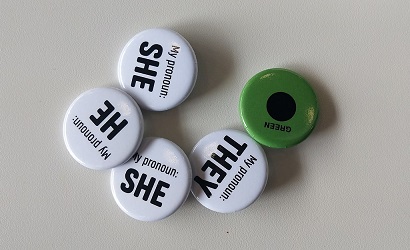
–>
October 4, 2022
Pronoun mania has taken over the country. So much so that my grandchildren tell me that the first order of business at the start of a new semester is for everyone to proclaim their pronouns. Something similar happened to me when I signed up to attend a writer’s conference. I couldn’t believe that a professional organization expected me to walk around wearing a name tag declaring I was a “she.”
‘); googletag.cmd.push(function () { googletag.display(‘div-gpt-ad-1609268089992-0’); }); }
While some might think that this obsession with pronouns comes from the best of intentions, it’s much ado about nothing. I can talk to someone for hours without using a pronoun other than the second person “you.”
Yet, the Human Rights Campaign puts such stock in the matter that it advises us to introduce ourselves by name and pronoun. Their website asks us how we would feel if a coworker, family member, doctor or a friend routinely called us by the wrong pronoun? That’s a question that’s hard to answer as I’ve never been addressed by a pronoun, at least not to my face. People refer to me by name and I’m willing to bet that’s how it is for most of us.
All this time and effort given to pronouns is supposedly for inclusion purposes but Colin Wright, an evolutionary biologist, disagrees. In his article “When Asked ‘What Are Your Pronouns,’ Don’t Answer” he wrote that pronouns serve as an implicit endorsement of gender ideology.
‘); googletag.cmd.push(function () { googletag.display(‘div-gpt-ad-1609270365559-0’); }); }
What that means is that those of us who believe that gender is fixed at birth, and that there are only two, are being forced to accept and endorse something we do not believe in. It seems that the more we accept this craziness, the more craziness we release.
A family member has a therian co-worker who wants to be greeted each morning with meow. There are at least 14 otherkins which include people who identify as animals, machines, and elves. How much longer before we will be required to introduce ourselves not only by pronouns, but also by species? And when does this obsession with pronouns become intrusive?
Why aren’t the people pushing this agenda worried about the person who is not ready to come out? Or the young student who is going through feelings of identity uncertainty? Would sharing preferred pronouns make him or her feel more included or only add to the stress? People should not be forced to reveal things about themselves that they are not ready to share. Just as none of us should be forced or bullied into accepting that which we don’t believe.
 Pronouns aren’t the only words under attack. Some professionals have been told in the name of inclusion to stop addressing customers or clients with sir or ma’am. Heaven help us if we should slip and say ladies and gentlemen. Why do we have to throw common courtesy out the window just to please a few? That’s the least of it. Even the words mother and father are now under attack. The Biden administration replaced the word mother for birthing parent in the fiscal year budget and the National Education Association (NEA) considered a similar resolution. Fortunately, the proposal went nowhere, but the very fact that an organization that represents nearly three million teachers contemplated such a thing is worrisome.
Pronouns aren’t the only words under attack. Some professionals have been told in the name of inclusion to stop addressing customers or clients with sir or ma’am. Heaven help us if we should slip and say ladies and gentlemen. Why do we have to throw common courtesy out the window just to please a few? That’s the least of it. Even the words mother and father are now under attack. The Biden administration replaced the word mother for birthing parent in the fiscal year budget and the National Education Association (NEA) considered a similar resolution. Fortunately, the proposal went nowhere, but the very fact that an organization that represents nearly three million teachers contemplated such a thing is worrisome.
To refer to mothers by their reproductive capacity is to dehumanize them and is the worst possible insult to any woman who has devoted her life to loving and nurturing a child. The word Mommy or the like is the first word out of just about every human mouth, which speaks to the strong emotional bond between mother and child.
Women have had to fight long and hard to gain certain rights. Now it looks like we’re going to have to fight for the basic right to be called mother.
‘); googletag.cmd.push(function () { googletag.display(‘div-gpt-ad-1609268078422-0’); }); } if (publir_show_ads) { document.write(“
Mothers aren’t the only ones under attack. The House of Representatives has done away with any language that does not “honor” and include all gender identities. To that end, they banned words like father, sister, brother and daughter. Why not go a step further and erase such non-inclusive words as lesbian and trans? And how is the phrase LGBTQ inclusive? I’m sure the NEA and our politicians could come up with something as insulting to our Pride friends as birthing person is to mothers.
In the so-called pursuit of inclusion, workers and students across the country are required to attend sensitivity training. We’re told this is geared to building a culture of dignity, respect, and tolerance. It sounds great, but apparently “sensitivity” only works one way. Certainly the participants in a recent Pride parade weren’t thinking sensitivity or respect when they romped naked and made sexual gestures in front of young children.
Personally, I take offense when asked my pronoun. I don’t identify as a woman. I am a woman, just as I’m a wife and mother. That’s the reality of it. To ask my pronoun is to suggest otherwise. Just because a man “identifies” as a woman (or vice-versa) doesn’t make it so and gender-fraud is a real problem.
Male prisoners in some states have only to declare themselves women to be housed in female prisons — no gender-reassignment surgery required. It’s no surprise that this has resulted in female prisoners being raped or made pregnant. Here we have yet another misguided attempt to show the LGBTQ community sensitivity and respect. In return women’s lives are put in danger.
By all means, let’s respect people regardless of identities, but not at the price of turning our streets into freak shows, our prisons into orgies, and our language into meaningless and, in some cases, insulting words.
As for pronouns, if you feel the need to tell me yours and are comfortable doing so, fine. I can respect your pronoun preferences even though we don’t share ideologies. Just don’t insult me by asking mine.
New York Times bestselling author Margaret Brownley has penned more than fifty novels. Some of her favorite people call her Mom and Grandma.
Image: Edward
<!– if(page_width_onload <= 479) { document.write("
“); googletag.cmd.push(function() { googletag.display(‘div-gpt-ad-1345489840937-4’); }); } –> If you experience technical problems, please write to helpdesk@americanthinker.com
FOLLOW US ON
<!–
–>
<!– _qoptions={ qacct:”p-9bKF-NgTuSFM6″ }; ![]() –> <!—-> <!– var addthis_share = { email_template: “new_template” } –>
–> <!—-> <!– var addthis_share = { email_template: “new_template” } –>





